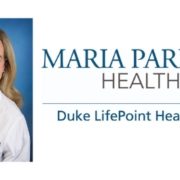New Maria Parham Women’s Care OBGYN: Know Facts About COVID-19 Vaccine, Pregnancy
Dr. Michaela Beynon, an OB-GYN, has joined Maria Parham Women’s Care and brings to the practice experience in high-risk pregnancy management, among other women’s care concerns and issues.
Maria Parham Health CEO Bert Beard said Beynon’s commitment to women’s health issues and wellness is an asset to the MPH organization. “Dr. Beynon further strengthens our network of physicians, as she is devoted to providing high-quality care and helping people make important health care decisions,” Beard said in a written statement to WIZS News.
Beynon received her medical education at Ross University School of Medicine in the West Indies and completed her residency at Aultman Hospital OBGYN in Canton, OH. She also has a masters of neuroscience from Queen’s University in Ontario, Canada.
Beynon has not wasted any time getting important information about the COVID-19 vaccination out to pregnant women and those who want to become pregnant.
She addresses some frequently asked questions about pregnancy and the COVID-19 vaccine – its safety and effectiveness for women who are pregnant, who have recently given birth, or who plan to start or add to their family in the future.
Beynon wrote an article titled “Creating Healthier Families One Shot At A Time” which she recently shared with WIZS News.
“I love helping moms-to-be stay healthy and prepare to welcome their baby into the world,” Beynon writes. “As you can imagine, one of the most important conversations I’ve been having lately with my patients is around COVID-19 vaccines and their safety for those who are pregnant or who are in the planning stage of their pregnancy journey.”
Beynon spells out through a question-and-answer format information for women and families to consider, from possible fertility issues the vaccine may cause to the safety of breastfeeding and the vaccine.
Contact 252.492.8576 or visit the Find a Doctor tab at MariaParham.com to make an appointment. For help finding a medical provider near you, call 800.424.DOCS.
Following are commonly asked questions to which Beynon has responded:
Q: Why is it important for pregnant women or those planning to become pregnant to be vaccinated against COVID-19?
A: Pregnant individuals are at a higher risk for severe illness, complications and death than non-pregnant individuals if infected with COVID-19. Also, in some cases, pregnancy can come with medical conditions that put women at even further risk. The best way to protect yourself against potential harm from a COVID-19 infection is to be vaccinated. This is especially true with the continued rise of cases from the more contagious Delta variant and new variants as they emerge.
Q: Does the COVID-19 vaccine cause fertility problems for women or men?
A: The simple answer is no. There is no evidence that getting the COVID-19 vaccine affects fertility in individuals trying to become pregnant, including those using in vitro fertilization methods. The safety profiles and the way the vaccines work to prevent infection and illness from COVID-19 do not cause infertility in men or women.
Q: If I’m trying to become pregnant, do I need to avoid pregnancy for a specific period of time after being vaccinated?
A: No. Whether you are trying to have a baby now or in the future, it is safe for both parents to receive the COVID-19 vaccine. There is no need for a waiting period. Additionally, if you become pregnant after your first dose of the Pfizer or Moderna COVID-19 vaccine, you should still receive your second dose as indicated and recommended (three weeks after your first dose of Pfizer and four weeks after your first dose of Moderna).
Q: Do I need to take a pregnancy test before receiving the COVID-19 vaccine?
A: No. The Centers for Disease Control and Prevention (CDC) does not recommend routine pregnancy testing before getting vaccinated against COVID-19.
Q: What if I am currently pregnant or breastfeeding? Is it safe for me to get the vaccine?
A: Yes. Whether you are currently pregnant or breastfeeding your new baby, it is safe for you to get vaccinated against COVID-19. None of the Food and Drug Administration (FDA)-authorized or approved vaccines contain the live COVID-19 virus, so the vaccines do not present a risk of COVID-19 infection for you or your baby.








